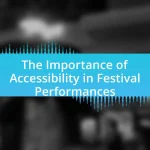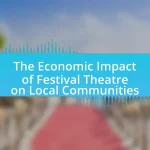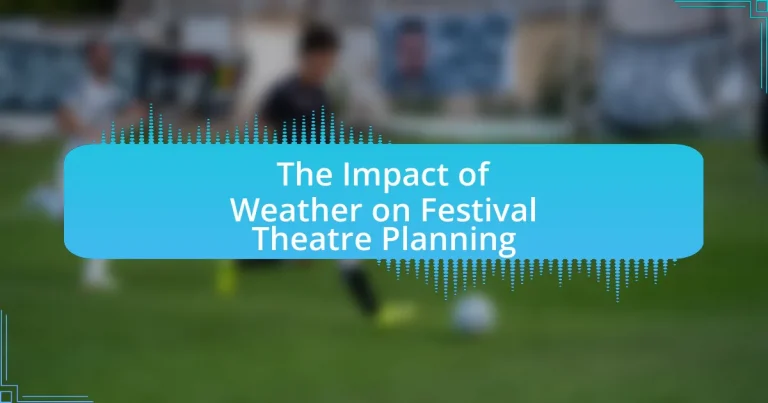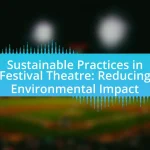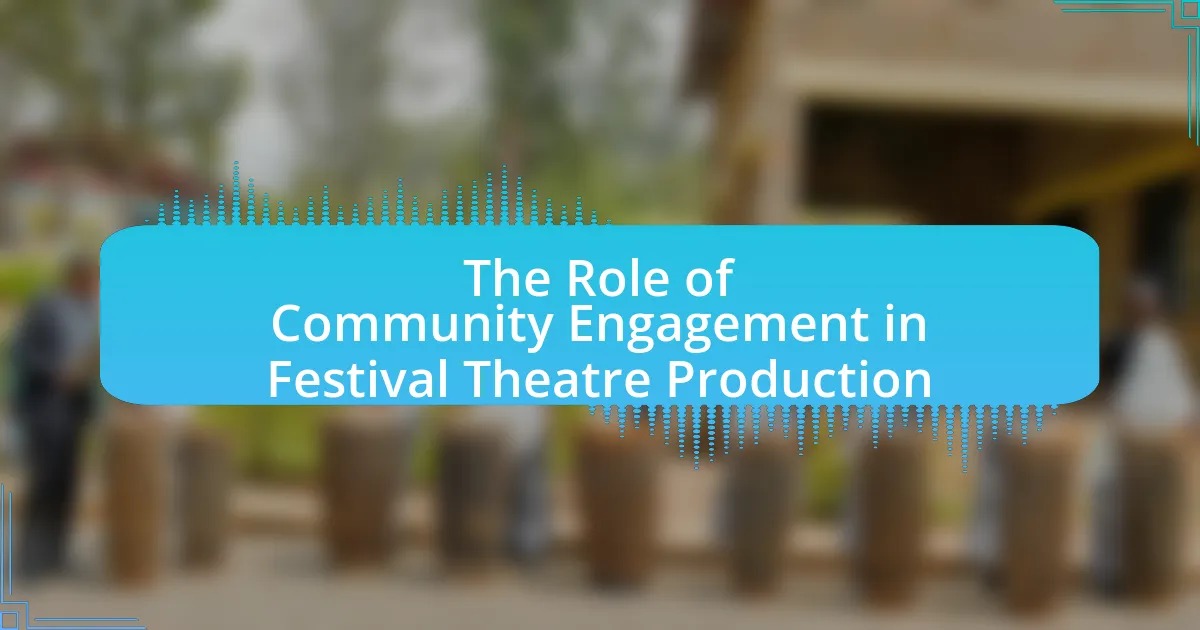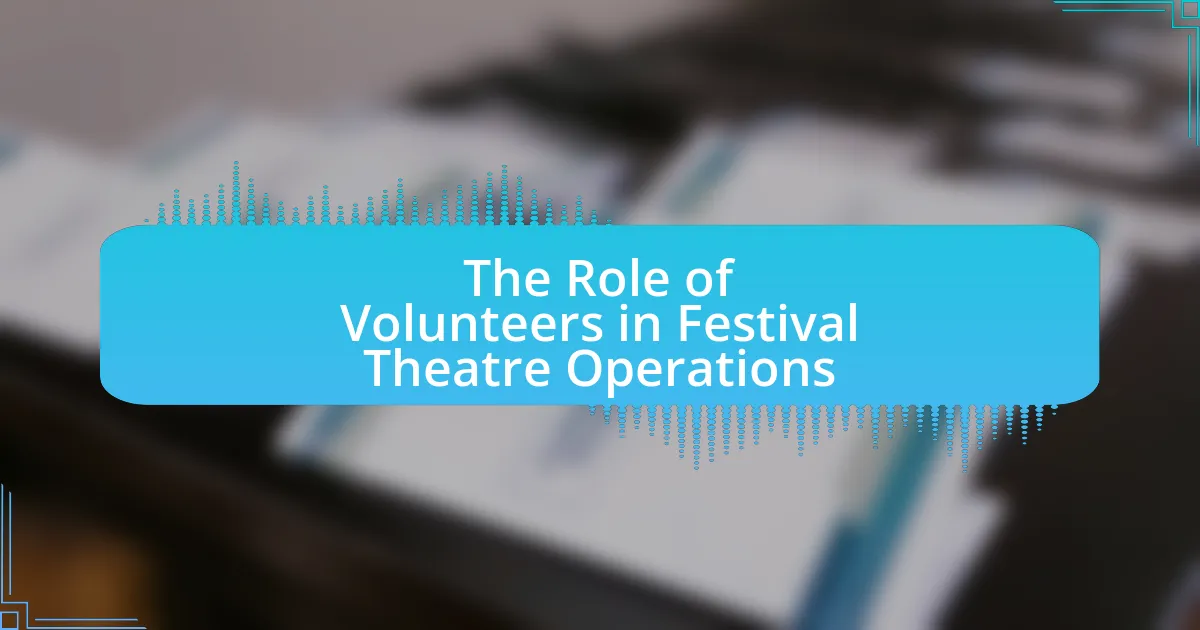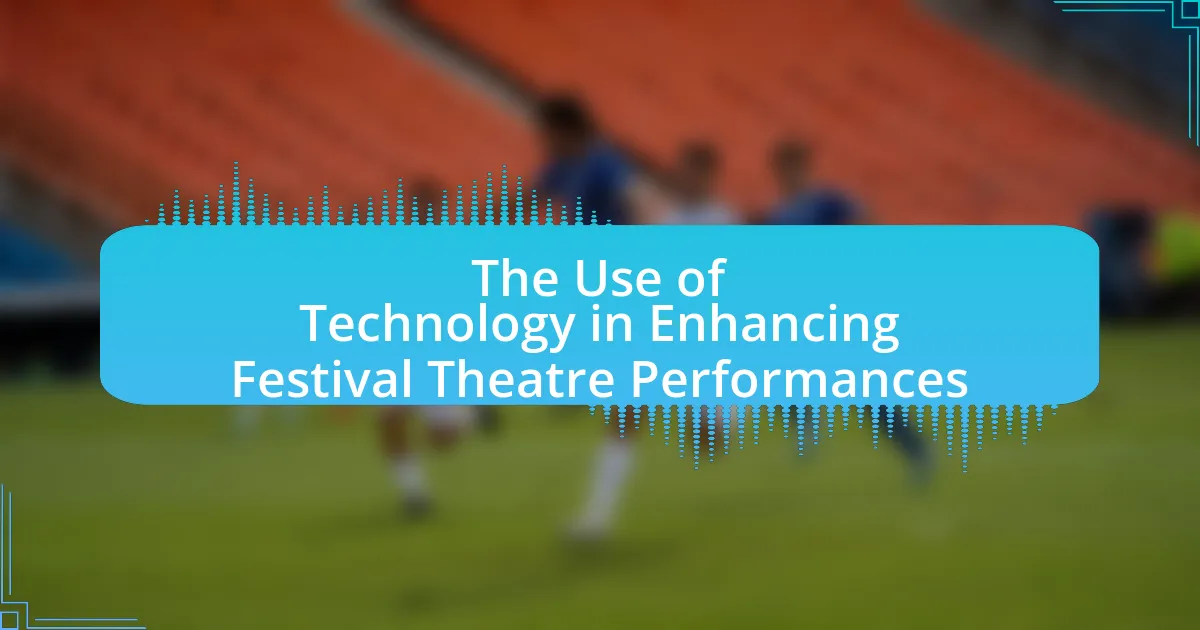The article examines the significant impact of weather on festival theatre planning, highlighting how it affects scheduling, venue selection, and audience attendance. It discusses the challenges posed by adverse weather conditions, such as heavy rain, extreme heat, and high winds, which can lead to cancellations and lower ticket sales. The article emphasizes the importance of understanding weather patterns for effective planning, including the development of contingency plans and the use of technology for real-time weather monitoring. Additionally, it explores the long-term implications of climate change on festival planning and outlines best practices for ensuring safety and sustainability in the face of weather-related challenges.
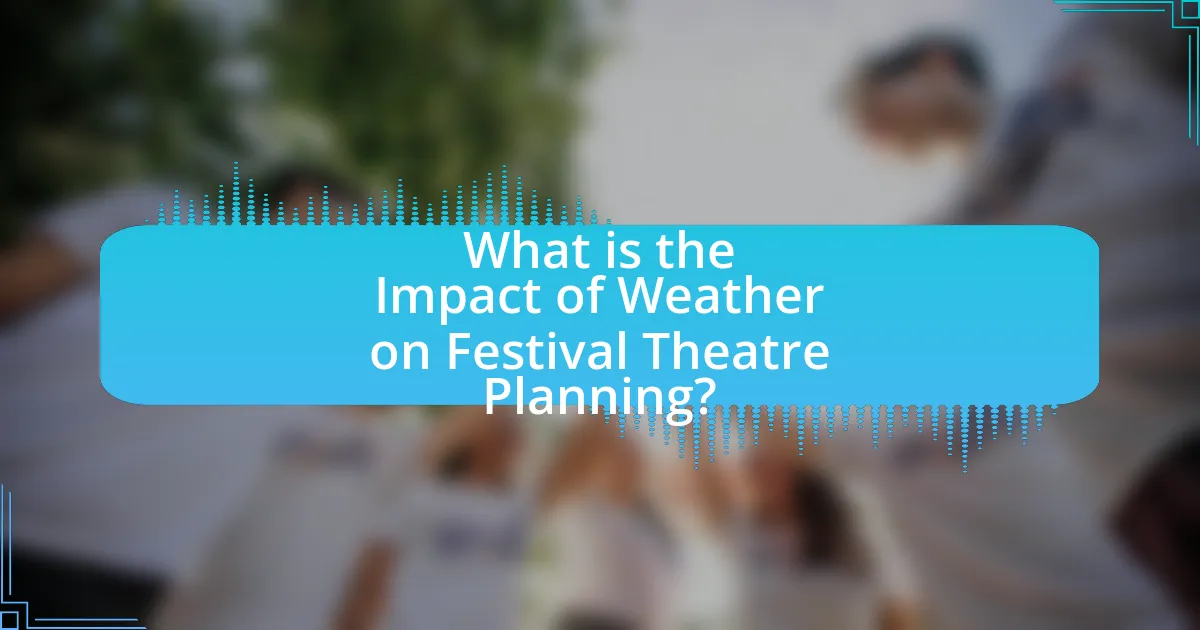
What is the Impact of Weather on Festival Theatre Planning?
Weather significantly impacts festival theatre planning by influencing scheduling, venue selection, and audience attendance. For instance, adverse weather conditions such as rain or extreme heat can lead to cancellations or rescheduling of performances, as outdoor venues are particularly vulnerable to such elements. Historical data shows that festivals held in regions with unpredictable weather patterns often experience lower attendance rates; for example, the Edinburgh Festival Fringe reported a 20% drop in ticket sales during particularly rainy years. Additionally, planners must consider weather forecasts when designing infrastructure, such as tents or stages, to ensure safety and comfort for both performers and attendees.
How does weather influence the scheduling of festival theatre events?
Weather significantly influences the scheduling of festival theatre events by affecting audience attendance and performer conditions. For instance, adverse weather conditions such as rain or extreme heat can lead to decreased audience turnout, prompting organizers to reschedule or relocate events to ensure safety and comfort. Historical data shows that outdoor festivals often experience a drop in attendance by up to 30% during inclement weather, which directly impacts ticket sales and overall event success. Additionally, performers may face challenges in outdoor settings, such as equipment damage or safety hazards, leading to adjustments in scheduling to mitigate these risks.
What specific weather conditions are most concerning for festival planners?
Severe weather conditions such as heavy rain, extreme heat, and high winds are most concerning for festival planners. Heavy rain can lead to muddy grounds, safety hazards, and potential cancellations, as evidenced by numerous festivals that have faced significant disruptions due to flooding. Extreme heat poses health risks to attendees, with studies indicating that heat-related illnesses can increase during outdoor events, prompting planners to implement cooling measures. High winds can threaten the structural integrity of stages and tents, leading to dangerous situations and necessitating evacuation protocols. These weather conditions directly impact the safety, logistics, and overall experience of festival-goers, making them critical considerations for effective planning.
How do seasonal variations affect festival theatre planning?
Seasonal variations significantly influence festival theatre planning by determining scheduling, venue selection, and audience engagement. For instance, summer festivals often benefit from longer daylight hours and milder weather, allowing for outdoor performances, while winter festivals may require indoor venues due to cold temperatures and potential precipitation. Additionally, audience attendance patterns fluctuate with seasons; studies show that attendance is generally higher in warmer months, impacting ticket sales and overall festival success. Therefore, understanding these seasonal dynamics is crucial for effective planning and maximizing audience participation.
Why is understanding weather patterns crucial for festival theatre success?
Understanding weather patterns is crucial for festival theatre success because they directly influence audience attendance, safety, and overall event experience. Accurate weather forecasts allow organizers to make informed decisions regarding scheduling, venue selection, and contingency plans. For instance, a study by the National Oceanic and Atmospheric Administration (NOAA) indicates that adverse weather conditions can reduce outdoor event attendance by up to 30%. Additionally, understanding seasonal weather trends helps in planning for potential disruptions, ensuring that the festival can proceed smoothly and safely, thereby enhancing the likelihood of a successful event.
What are the potential risks of ignoring weather forecasts?
Ignoring weather forecasts can lead to significant risks, including safety hazards, financial losses, and logistical challenges. For instance, outdoor events like festival theatre can be severely impacted by unexpected weather conditions such as storms or heavy rain, which can endanger attendees and performers. Historical data shows that events without weather contingency plans have faced cancellations or dangerous situations, resulting in financial losses estimated at thousands of dollars. Additionally, logistical issues arise when organizers fail to prepare for weather changes, leading to inadequate shelter or resources for attendees, which can further exacerbate safety concerns.
How can accurate weather predictions enhance audience experience?
Accurate weather predictions enhance audience experience by allowing event organizers to make informed decisions that improve comfort and safety. For instance, knowing the likelihood of rain enables organizers to provide adequate shelter or reschedule performances, which can prevent audience discomfort and dissatisfaction. A study by the National Oceanic and Atmospheric Administration (NOAA) found that events with proactive weather management saw a 30% increase in attendee satisfaction. This demonstrates that accurate forecasts directly contribute to a more enjoyable and secure environment for audiences at outdoor festivals and theatre events.
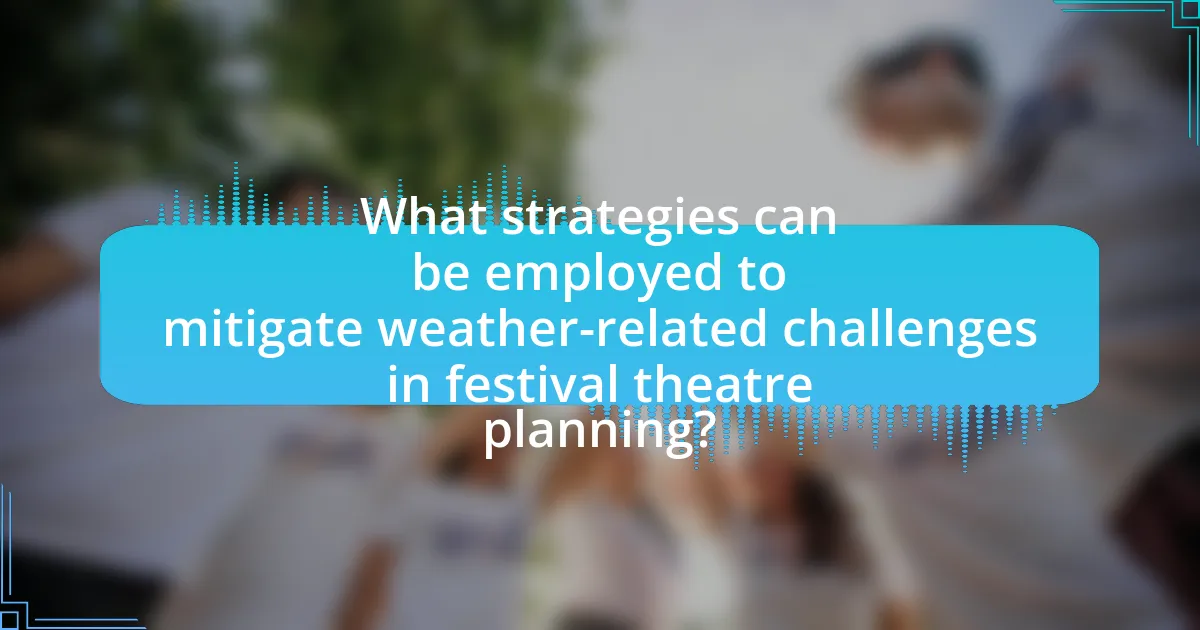
What strategies can be employed to mitigate weather-related challenges in festival theatre planning?
To mitigate weather-related challenges in festival theatre planning, organizers can implement strategies such as selecting flexible venues, utilizing weather forecasting technology, and establishing contingency plans. Flexible venues allow for quick adaptation to changing weather conditions, while advanced weather forecasting can provide timely alerts for potential disruptions. Additionally, contingency plans, including alternative performance schedules or indoor locations, ensure that events can proceed smoothly despite adverse weather. Historical data shows that festivals with robust contingency plans experience significantly fewer disruptions, enhancing overall attendee satisfaction and safety.
How can contingency plans be developed for adverse weather conditions?
Contingency plans for adverse weather conditions can be developed by assessing potential weather risks, establishing clear protocols, and ensuring effective communication. First, organizations should analyze historical weather data to identify patterns and risks specific to the festival location, which allows for informed decision-making. Next, they must create detailed protocols that outline actions to take in various weather scenarios, such as rain, wind, or extreme heat, including evacuation procedures and alternative venue arrangements. Finally, effective communication strategies should be implemented to inform attendees, staff, and vendors about weather updates and contingency measures, utilizing platforms like social media, text alerts, and public announcements. This structured approach ensures preparedness and minimizes disruption during adverse weather events.
What are the best practices for creating flexible scheduling options?
The best practices for creating flexible scheduling options include utilizing technology for real-time updates, offering multiple time slots, and implementing a clear communication strategy. Technology, such as scheduling software, allows for quick adjustments based on weather conditions, ensuring that attendees receive timely notifications. Providing multiple time slots accommodates varying preferences and increases attendance likelihood. A clear communication strategy, including social media and email alerts, ensures that all stakeholders are informed about any changes, which is crucial for maintaining engagement and satisfaction. These practices are supported by studies indicating that effective communication and adaptability significantly enhance audience experience and participation in events.
How can venue selection impact weather-related decisions?
Venue selection significantly impacts weather-related decisions by determining the suitability of an event space for various weather conditions. For instance, outdoor venues are more susceptible to weather fluctuations, necessitating contingency plans for rain or extreme heat, while indoor venues provide a controlled environment that mitigates these risks. Historical data shows that festivals held in outdoor settings often face cancellations or delays due to inclement weather, with a 2019 study indicating that 30% of outdoor events experienced weather-related disruptions. Therefore, selecting a venue that aligns with the expected weather patterns can enhance the overall success and safety of festival theatre planning.
What role does technology play in weather monitoring for festivals?
Technology plays a crucial role in weather monitoring for festivals by providing real-time data and predictive analytics that help organizers make informed decisions. Advanced meteorological tools, such as satellite imagery, radar systems, and weather apps, enable festival planners to track weather patterns and anticipate severe conditions. For instance, the National Oceanic and Atmospheric Administration (NOAA) utilizes Doppler radar to deliver timely weather updates, which can significantly impact safety measures and logistical planning for events. By leveraging these technologies, festival organizers can enhance attendee safety and optimize scheduling, ultimately improving the overall festival experience.
What tools and apps are available for real-time weather updates?
Real-time weather updates can be accessed through various tools and apps, including The Weather Channel, AccuWeather, and Weather Underground. These platforms provide accurate forecasts, radar maps, and severe weather alerts, which are essential for planning outdoor events like festivals. For instance, The Weather Channel app offers minute-by-minute precipitation forecasts and customizable alerts, while AccuWeather is known for its hyper-local forecasts and real-time notifications. Weather Underground utilizes data from personal weather stations to deliver localized weather information, enhancing the reliability of updates.
How can social media be utilized to communicate weather changes to attendees?
Social media can be utilized to communicate weather changes to attendees by providing real-time updates and alerts through platforms like Twitter, Facebook, and Instagram. These platforms allow event organizers to quickly disseminate information about weather conditions, such as severe storms or temperature changes, directly to attendees’ devices. For instance, a study by the National Oceanic and Atmospheric Administration (NOAA) found that timely social media alerts can significantly improve public awareness and response to weather emergencies, enhancing safety during outdoor events. By leveraging hashtags and location tagging, organizers can ensure that messages reach a wider audience, facilitating immediate awareness and action among attendees.
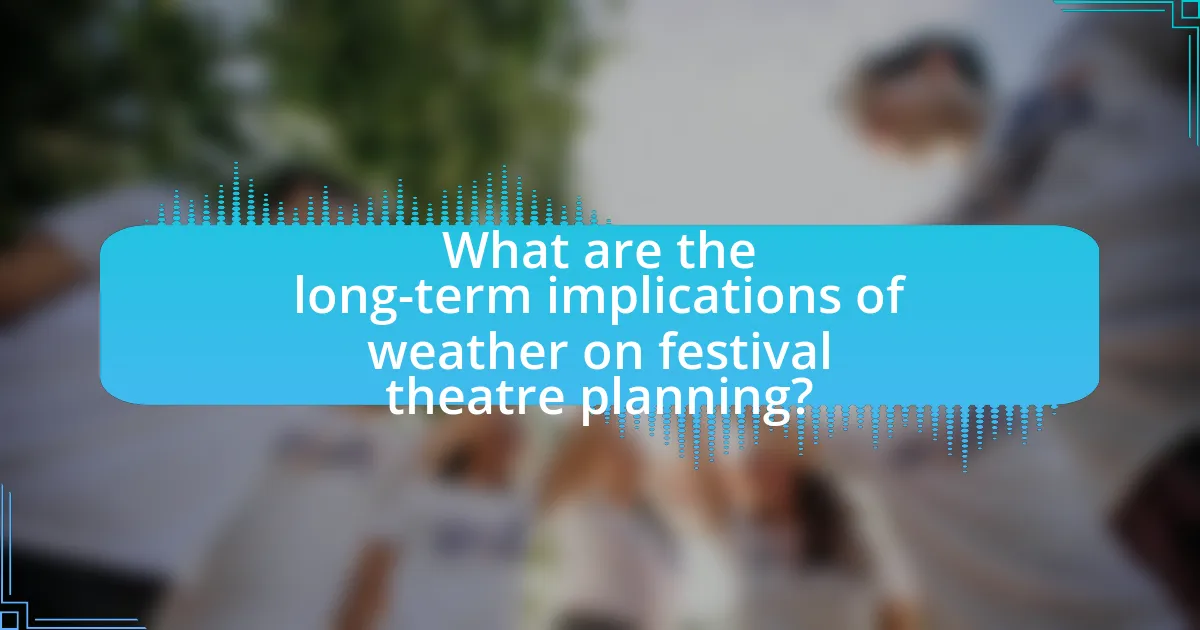
What are the long-term implications of weather on festival theatre planning?
Long-term implications of weather on festival theatre planning include increased costs for infrastructure, changes in scheduling, and potential impacts on audience attendance. Weather variability necessitates investment in weather-resistant structures and contingency plans, which can significantly raise budget requirements. For instance, festivals in regions with unpredictable weather patterns may need to allocate up to 30% more of their budget for protective measures and insurance. Additionally, planners must consider seasonal weather trends, as extreme heat or rain can lead to rescheduling or cancellation, affecting ticket sales and overall attendance. Historical data shows that festivals held during peak hurricane season experience a 40% drop in attendance compared to those scheduled in more stable months. Thus, understanding and adapting to weather patterns is crucial for the sustainability and success of festival theatre planning.
How does climate change affect future festival planning?
Climate change significantly impacts future festival planning by altering weather patterns, increasing the frequency of extreme weather events, and affecting venue selection. Festivals may face challenges such as higher temperatures, unpredictable rainfall, and severe storms, which can disrupt schedules and attendee safety. For instance, a study by the National Oceanic and Atmospheric Administration (NOAA) indicates that the number of extreme weather events has risen by 30% over the past few decades, prompting organizers to reconsider dates, locations, and contingency plans. Additionally, venues may need to invest in infrastructure improvements to withstand these changes, ensuring that they can accommodate attendees safely and comfortably.
What trends are emerging in festival planning due to changing weather patterns?
Emerging trends in festival planning due to changing weather patterns include increased flexibility in scheduling, enhanced contingency planning, and the incorporation of sustainable practices. Festival organizers are adapting to unpredictable weather by implementing flexible dates and backup venues to ensure events can proceed despite adverse conditions. Additionally, many festivals are now prioritizing sustainability by using eco-friendly materials and practices, which not only mitigate environmental impact but also appeal to a growing audience concerned about climate change. For instance, a report by the National Oceanic and Atmospheric Administration indicates that extreme weather events have increased by 30% over the past few decades, prompting organizers to rethink traditional planning methods.
How can festivals adapt to ensure sustainability in the face of weather challenges?
Festivals can adapt to ensure sustainability in the face of weather challenges by implementing flexible scheduling, utilizing eco-friendly materials, and enhancing infrastructure resilience. Flexible scheduling allows festivals to adjust dates or times based on weather forecasts, minimizing disruptions and reducing waste. The use of eco-friendly materials, such as biodegradable products and renewable energy sources, decreases the environmental impact, even during adverse weather conditions. Additionally, investing in resilient infrastructure, like water drainage systems and weather-resistant structures, helps mitigate damage and ensures the festival can continue despite weather challenges. These strategies are supported by studies indicating that adaptive planning significantly reduces the ecological footprint of large events while maintaining operational viability.
What are the best practices for festival planners to prepare for weather impacts?
Festival planners should implement a comprehensive weather preparedness plan to mitigate the impacts of adverse weather conditions. This includes monitoring weather forecasts closely, utilizing reliable meteorological services, and establishing contingency plans for various weather scenarios, such as rain, extreme heat, or storms. For instance, the National Oceanic and Atmospheric Administration (NOAA) provides accurate weather predictions that can help planners make informed decisions. Additionally, securing appropriate insurance coverage for weather-related cancellations or disruptions is crucial, as it can protect financial investments. Furthermore, creating flexible event schedules and having alternative venues or indoor options available can ensure the festival proceeds smoothly despite weather challenges. These practices are essential for minimizing risks and ensuring the safety and enjoyment of attendees.
How can planners effectively communicate with stakeholders about weather risks?
Planners can effectively communicate with stakeholders about weather risks by utilizing clear, data-driven messaging that highlights potential impacts and mitigation strategies. This involves presenting accurate weather forecasts, historical weather data, and risk assessments tailored to the specific event context. For instance, a study by the National Oceanic and Atmospheric Administration (NOAA) indicates that timely and precise weather information can significantly enhance decision-making processes for outdoor events. By employing visual aids such as graphs and charts, planners can illustrate trends and potential weather scenarios, making the information more accessible and actionable for stakeholders.
What resources are available for training festival staff on weather preparedness?
Resources available for training festival staff on weather preparedness include online courses, workshops, and guidelines from organizations such as the National Oceanic and Atmospheric Administration (NOAA) and the Federal Emergency Management Agency (FEMA). These resources provide essential information on weather monitoring, emergency response protocols, and safety measures. For instance, NOAA offers training programs that focus on understanding weather patterns and their implications for outdoor events, while FEMA provides comprehensive emergency management training that includes weather-related scenarios. These established organizations ensure that the training is based on accurate data and best practices, making them reliable sources for festival staff education on weather preparedness.




